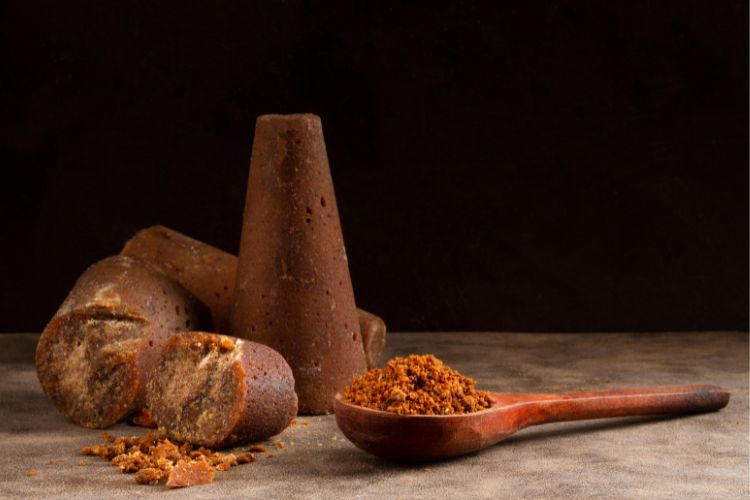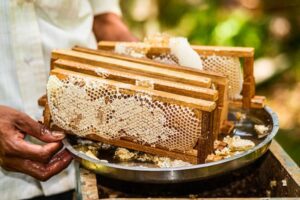Ever wondered how something as simple as your sweetener could impact a farmer’s life? When you choose locally made jaggery, especially organic jaggery near me, you’re not just picking a healthier alternative to sugar — you’re nurturing a sustainable chain that starts in the fields and ends in your kitchen.
The Power of Local Choices
Every time you buy a pack of organic jaggery made by regional farmers, you’re voting for a more ethical, transparent, and eco-friendly food system. Local jaggery production in states like West Bengal, Maharashtra, and Tamil Nadu often involves small-scale farmers who rely on seasonal sugarcane or date palm harvests. Your choice directly supports their livelihoods and helps preserve traditional sweet-making practices passed down for generations.
Why Supporting Farmers Matters?
Small jaggery producers face the double challenge of market competition and fluctuating crop yields due to climate change. By sourcing directly from local cooperatives or brands that work with rural producers, you help stabilize their income and encourage sustainable agricultural practices. According to data from the Food and Agriculture Organization (FAO), smallholder farms produce over one-third of the world’s food — and yet, they often earn less than a fair share of market profits.
- Fair pricing for their hard work and harvest.
- Reduced dependency on industrial sugar mills.
- Empowerment through community-based trade networks.
The Nutritional Edge of Organic Jaggery
Beyond its social impact, organic jaggery is a nutritional powerhouse. Unlike refined sugar, jaggery retains essential minerals such as iron, magnesium, and potassium. It’s also free from synthetic chemicals, making it ideal for conscious consumers. The slow-cooking process over wood fire or earthen furnaces keeps its natural goodness intact — something industrial processing simply can’t replicate.
When you shop for organic jaggery online, you’ll often notice a richer aroma and deeper caramel flavor compared to mass-produced sugar. That’s because artisanal jaggery still follows the time-tested process of boiling fresh sugarcane or palm sap — a skill honed through generations of craftsmanship.
Environmental Benefits: Sweet for You, Sweeter for the Planet
Local jaggery production isn’t just good for people — it’s kind to the planet, too. Organic cultivation avoids harmful fertilizers and pesticides that deplete soil quality and contaminate water sources. The reduced need for long-distance transport cuts down on carbon emissions, making it a more sustainable sweetener choice.
Consider this: every time you buy locally sourced jaggery instead of an imported sweetener, you’re minimizing packaging waste, energy use, and your overall carbon footprint. It’s a small, delicious step toward greener living.
How to Identify Authentic Organic Jaggery?
- Check the color: Pure jaggery is golden brown or dark amber — not shiny yellow (which may indicate chemicals).
- Smell it: Authentic jaggery has a deep, earthy aroma from palm or sugarcane juice.
- Read the label: Look for certifications like FSSAI or organic seals from recognized bodies.
- Buy from trusted local brands: Reputed producers like Joynagar are known for purity and traditional methods.
Why “Near Me” Makes a Difference?
Buying organic jaggery from local vendors ensures freshness, traceability, and genuine quality. It also means your money circulates within your own community — strengthening the local economy and supporting small businesses. When you search for “organic jaggery near me,” you’re not just looking for a product; you’re joining a movement that values health, sustainability, and humanity over mass production.
FAQs About Buying Organic Jaggery
1. Is organic jaggery healthier than sugar?
Yes. Organic jaggery contains natural minerals like iron and magnesium, unlike refined sugar, which is stripped of nutrients during processing. It also provides slow-releasing energy, making it a better choice for daily use.
2. How can I be sure the jaggery I buy is truly organic?
Check for organic certification marks and buy from verified sources such as Joynagar, which ensures purity and transparency in production.
3. Can organic jaggery be used in everyday cooking?
Absolutely! You can use it in tea, desserts, curries, or even baking. Its deep flavor adds a natural sweetness without overwhelming your dishes.
4. Why should I prefer local jaggery over imported or factory-made options?
Local jaggery supports nearby farmers, reduces transportation emissions, and guarantees fresher, more authentic quality than mass-produced alternatives.
Final Thoughts
Choosing organic jaggery is more than a dietary decision — it’s a compassionate act that connects you to your roots. Every cube or crumb you buy fuels rural livelihoods, protects the environment, and keeps India’s ancient food traditions alive. So the next time you crave sweetness, make it local — and make it count.



